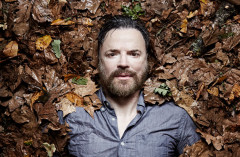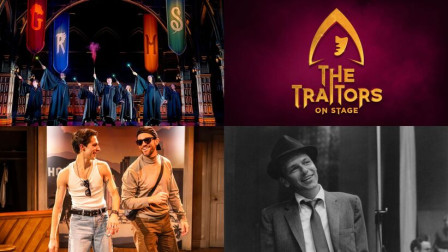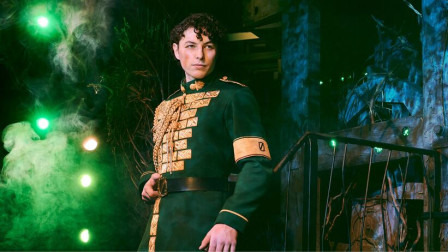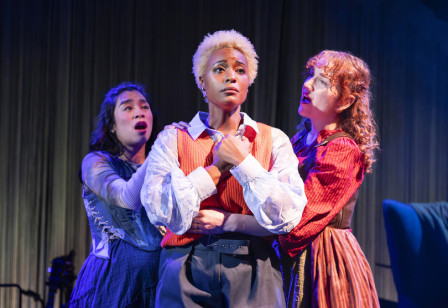Review: UNCLE VANYA at the Almeida Theatre
 The Russian playwright Anton Chekhov's comic drama UNCLE VANYA is indisputably one of the greatest plays ever written and the director Robert Icke is one of the rising stars of British Theater thanks to his acclaimed productions of the Oresteia and 1984 so the combination of the two is irresistible.
The Russian playwright Anton Chekhov's comic drama UNCLE VANYA is indisputably one of the greatest plays ever written and the director Robert Icke is one of the rising stars of British Theater thanks to his acclaimed productions of the Oresteia and 1984 so the combination of the two is irresistible.
I must say I was hoping he would take a more radical approach to the oft performed classic, in the event the only departures from the norm are modern dress and sparse cube of a set that revolves occasionally to give different perspectives.
Never the less it works. With anglicised, contemporary names for some of the characters (Uncle Vanya is now Uncle Johnnie!) the suffocating tedium of rural life is so powerfully evoked I found myself battling to stay awake in act one, not because the production is bad, you understand but because it captures so precisely long languorous afternoons with nothing much to do but mooch around the house.
There's three intervals which I liked because it allows you to refresh and caffeinate your brain ready to really concentrate on the minute details of what's to come, rather than the play becoming the usual three hour, attention draining trudge to the finish line.
And observing minute detail of character is what Chekhov is all about because there's very little plot to hook you. If you're new to the experience and that sounds off-putting don't be deterred, in those little details lie the great tragedies and ironies of existence.
The play dramatises life on an isolated country estate owned by a semi-acclaimed academic who lives in the city. The land is managed by his nephew who has dedicated his life to running the place. Events unfold over a few days when the academic's visit with his sexy young bride coincides with the return of a doctor who's a family friend. The household also includes an ineffectual neighbour, an old nanny, the elderly matriarch and her unprepossessing granddaughter, who also helps run the estate. Everybody bickers and develops doomed infatuations before alighting on an unpromising future. It's particularly unpromising in the original early twentieth century setting as the whole social order will be blown apart by communist inspired revolution. However by anglicising and contemporarise things Icke doesn't bother with any of that, allowing us to focus on the futility of existence.
This is a very good production. The whole cast are superb.
A good production is often surprisingly funny when performed by skilled actors who make us recognise our own fears, foibles and frustrations, in the onstage action. This is a very good production and there's plenty of laughs on the way to the existentially devastating conclusions.
The estate manager and the doctor fall in love with the academic's wife, she loves her elderly husband, he only cares for himself and the grand daughter harbours a crush on the doctor. All love is unrequited whilst the nanny potters around serving tea, the neighbour says stupid things and grandma glides above it all, lost in philosophical speculation.
The whole cast are superb at portraying the idiocy and despair of the suffocating situation but unusually it is Tobias Menzies as the soul-searching doctor, in full mid-life crisis mode who steals the show. He is so charismatic yet down to earth that I cared much more for him than the title character, usually the star role. Paul Rhys is rather too actory to capture the grind of day-to-day existence. When he flares into rage there's a theatricality about his performance that doesn't sit well with the realism of his fellow cast members.
The women are particularly good. Vanessa Kirby as the object of desire for everyone but the man she loves brings great depths of frustration and despair to a role that in other productions feels like a secondary character. Jessica Brown-Findlay from TVs DOWNTON ABBEY is the epitome of long term hopelessness and misery and the two older actresses brilliantly capture senior women who have retreated into caricatures of themselves to avoid confrontation.
Watching a Chekhov play demands concentration and stamina but it can be richly rewarding. You won't find a more immediate and relatable interpretation than this.
Latest News

 This Month in the West End (January 2026)
30 January 2026 at 17:36
This Month in the West End (January 2026)
30 January 2026 at 17:36

 Casting update revealed for West End production of WICKED
30 January 2026 at 14:27
Casting update revealed for West End production of WICKED
30 January 2026 at 14:27

 Full cast announced for David Hare's TEETH 'N' SMILES at Duke of York's Theatre
30 January 2026 at 11:02
Full cast announced for David Hare's TEETH 'N' SMILES at Duke of York's Theatre
30 January 2026 at 11:02

 Review: BALLAD LINES at Southwark Playhouse (Elephant)
30 January 2026 at 10:52
Review: BALLAD LINES at Southwark Playhouse (Elephant)
30 January 2026 at 10:52
